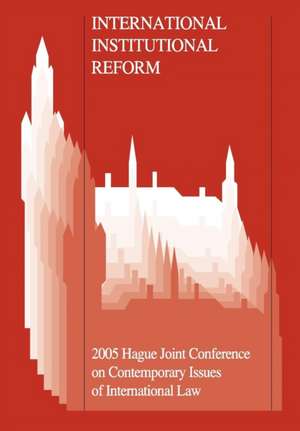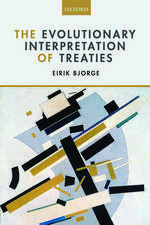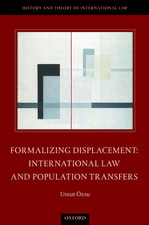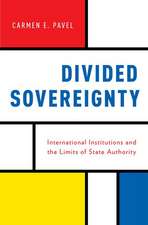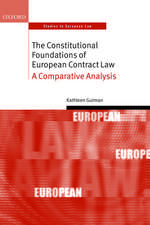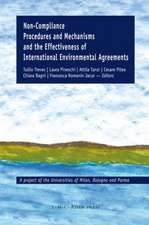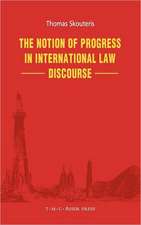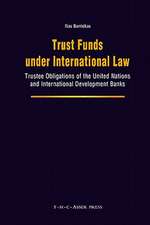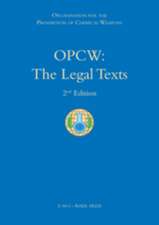International Institutional Reform: 2005 Hague Joint Conference on Issues of International Law
Editat de Agata A. Fijalkowskien Limba Engleză Paperback – 24 ian 2007
‘International Institutional Reform’ was the theme of the 2005 Hague Joint Conference on Contemporary Issues of International Law, which formed the basis of this book. This international Conference was attended by an interesting mix of established authorities and promising newcomers, practitioners and academics, international institution “insiders” and ‘users’, which resulted in a lively debate. The contributions of the forty-five speakers and the debate are included in the book.
Preț: 375.29 lei
Nou
Puncte Express: 563
Preț estimativ în valută:
71.84€ • 73.93$ • 60.56£
71.84€ • 73.93$ • 60.56£
Carte tipărită la comandă
Livrare economică 25 februarie-03 martie
Preluare comenzi: 021 569.72.76
Specificații
ISBN-13: 9789067042505
ISBN-10: 9067042501
Pagini: 363
Ilustrații: XXII, 363 p.
Dimensiuni: 170 x 242 x 20 mm
Greutate: 0.61 kg
Ediția:1st Edition.
Editura: T.M.C. Asser Press
Colecția T.M.C. Asser Press
Locul publicării:The Hague, Germany
ISBN-10: 9067042501
Pagini: 363
Ilustrații: XXII, 363 p.
Dimensiuni: 170 x 242 x 20 mm
Greutate: 0.61 kg
Ediția:1st Edition.
Editura: T.M.C. Asser Press
Colecția T.M.C. Asser Press
Locul publicării:The Hague, Germany
Public țintă
Professional/practitionerDescriere
The 7th Hague Joint Conference in 2005 considered the main challenges that international law faces concerning the reform of institutions that carry great authority, and reflect long-standing tradition and far-reaching effect. International Institutional Reform provides an overview of the main subjects that the conference panels dealt with, such as whether certain international organizations lend themselves to reform; the role of the Security Council; the European Union and institutional reform; and the inter-play between national, regional and international courts. The book presents a valuable overview of the wide range of topical subjects covered by leading scholars in the field. Further, the reader is challenged with innovative and insightful suggestions concerning reforms. The energy, enthusiasm and passion that were evident at the conference discussions are documented here, as well as demonstrating the creativity and innovation among international law scholars and practitioners.
Cuprins
Reformability: Why (and How) are Some International Organizations Able to Reform Themselves and Others Not?.- Has the Time Come for a Permanent War Damage Compensation Commission.- The Expanding Powers of the Security Council.- The Role of International Institutions in Territorial Administration and Post-Conflict Justice.- The United States and International Organizations.- Institutional Reform and the European Union.- UN-Reform: What Follow-up to the High Level Panel Report and the Recommendations by the Secretary-General?.- The Interplay Between National, Regional and International Courts: Fragmentation or Figmentation?.- Institutional Challenges Facing Regional Human Rights Courts.- Specialized and Niche International Institutions: Special Issues of Reform.- ICSID and Other Investment Arbitration Tribunals: Is There a Need for Judicial Oversight or Other Reforms?.- Alternative Paths to International Institutional Reform.- Plenary Lunch Session.- Final Session.
Textul de pe ultima copertă
‘International Institutional Reform’ was the theme of the 2005 Hague Joint Conference on Contemporary Issues of International Law, which formed the basis of this book. This international Conference was attended by an interesting mix of established authorities and promising newcomers, practitioners and academics, international institution “insiders” and ‘users’, which resulted in a lively debate. The contributions of the forty-five speakers and the debate are included in the book.
The topics cover a wide range of international institutions and address questions such as: Are international institutions that were for the most part created in the 20th century, suited to dealing with the challenges of the 21st century? What is the self-reforming or self-cleansing power of international organizations? How much can be managed by relying on the implied powers doctrine? Which international institutions have been particularly successful in achieving their objectives and why? Which institutions have proved to be failures and ought to be scrapped forthwith?The final chapter includes the results of the workshops, conclusions and recommendations, and the interesting debate on effective reform of international institutions.The book is therefore highly recommended to everyone – academics, practitioners and policy-makers – working at international organizations or cooperating with them.
The Seventh Hague Joint Conference was organized by the ‘The Hague Joint Conferences on International Law’ Foundation, in which the American Society of International Law, the Netherlands Society of International Law and the T.M.C. Asser Institute (The Hague) participate. The Conference was held in The Hague.
